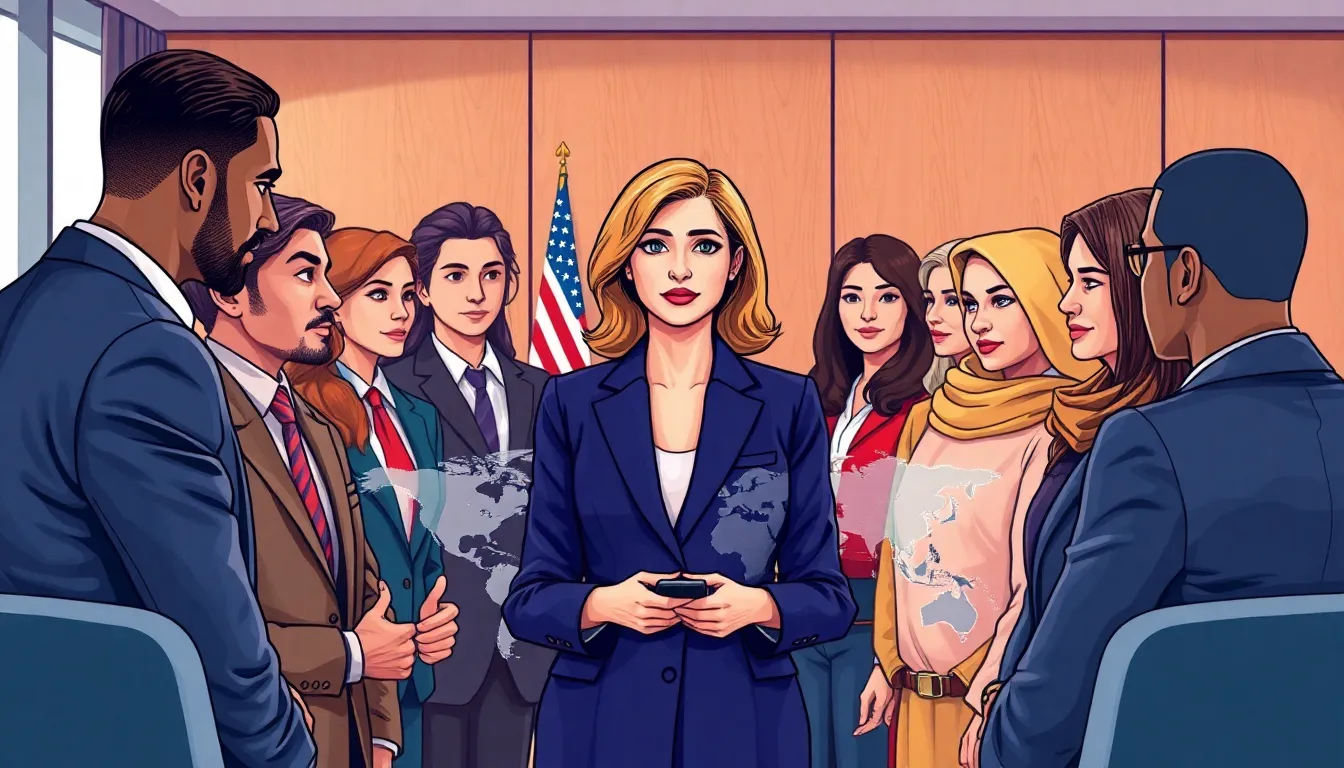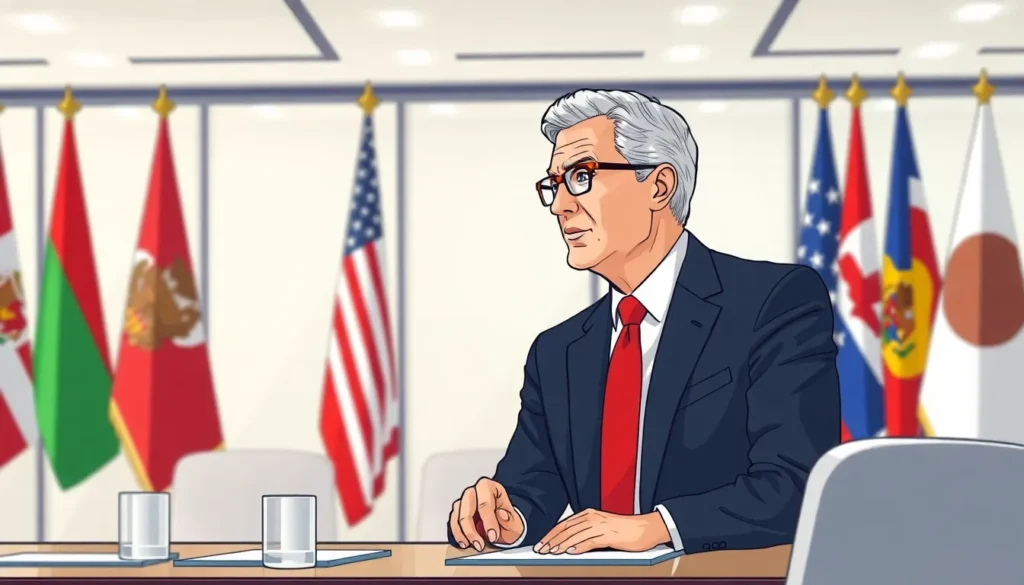Table of Contents
ToggleIn a world where borders blur and nations collide, international affairs play a crucial role in shaping our daily lives—whether we like it or not. From trade agreements that can make or break economies to diplomatic negotiations that feel like a high-stakes game of chess, the global stage is anything but dull. It’s a wild ride where every decision can spark a ripple effect across continents.
Overview of International Affairs
International affairs encompass various activities, policies, and interactions between countries. Diplomacy plays a crucial role in this field, facilitating dialogue and negotiation to resolve conflicts and foster cooperation. Trade agreements influence economic relationships, impacting markets and job opportunities globally. Multilateral organizations, such as the United Nations and NATO, provide platforms for countries to collaborate on pressing issues.
Geopolitical strategies shape national policies, often determining alliances and rivalries. The global economy reflects these strategies, with shifts in trade networks affecting global supply chains. Human rights advocacy also intertwines with international relations, as countries work together to address violations.
Security concerns often dominate discussions in international affairs. Terrorism, cyber threats, and climate change challenge global stability and demand collaborative solutions. Countries must navigate these issues while balancing national interests and international obligations.
Cultural exchanges enrich international relations, fostering understanding and appreciation among nations. Educational programs and cultural diplomacy enable societies to connect on a human level, enhancing global cooperation.
Ultimately, international affairs require constant vigilance and engagement. Understanding the dynamics of these interactions offers insights into how global events shape daily life and influence decision-making. Countries’ actions resonate far beyond their borders, highlighting the interconnectedness of the modern world.
Key Players in International Affairs

Governments play a vital role in shaping international affairs. They create policies, negotiate treaties, and establish trade agreements that impact global relations. Each nation’s foreign policy reflects its interests and priorities, influencing everything from security alliances to economic partnerships. Major powers, like the United States and China, often dictate the global agenda due to their economic and military capabilities.
Non-governmental organizations (NGOs) significantly contribute to international affairs by addressing global issues such as human rights, environmental protection, and humanitarian aid. These entities often advocate for policy changes and provide crucial services in times of crisis. Their grassroots efforts can influence public opinion and government actions, making them key players in shaping policy decisions and mobilizing resources.
International organizations, like the United Nations and NATO, facilitate collaboration among nations. They serve as platforms for negotiation and dialogue, fostering cooperation on issues like security, development, and climate change. Through their various programs, these organizations help coordinate collective responses to global challenges, enhancing the overall effectiveness of international diplomacy.
Major Trends in International Affairs
International affairs reflect evolving trends that shape global dynamics. Key among these trends are globalization, geopolitical shifts, and environmental challenges.
Globalization
Globalization connects economies and cultures, fostering trade and investment across borders. Increased interdependence among nations drives growth and innovation. Transnational corporations play a vital role, influencing local economies and job markets. With technology facilitating instant communication, information flow accelerates collaboration. Economic integration leads to shared challenges, impacting domestic policies and priorities. Countries participate in global supply chains, which can create vulnerabilities, as seen during recent disruptions.
Geopolitical Shifts
Geopolitical shifts result from emerging powers and changing alliances. Nations like China and India influence global politics and economics, challenging traditional power structures. Conflicts in regions such as the Middle East affect global energy markets and security. Rivalries, particularly between major powers, reshape diplomatic strategies and defense policies. These changes demand countries reassess their foreign policies to address new threats and opportunities. The rise of regional organizations provides platforms for collaboration and conflict resolution.
Environmental Challenges
Environmental challenges pose significant risks to global stability. Climate change affects weather patterns, leading to natural disasters that impact economies and populations. International cooperation becomes essential for addressing issues like carbon emissions and resource management. Agreements like the Paris Accord illustrate collective efforts to mitigate climate change’s effects. Biodiversity loss and pollution jeopardize public health and economic growth. Countries face pressure to implement sustainable practices and environmental policies, encouraging innovation in green technologies.
The Role of International Law
International law plays a fundamental role in regulating the interactions between nations. Countries rely on treaties and conventions to establish guidelines that govern various aspects of diplomacy, trade, and human rights. Moreover, international law provides a framework for resolving disputes peacefully, thus preventing conflicts from escalating.
Treaties, such as the United Nations Charter, set out essential principles that shape global relations. These principles include the respect for sovereignty, the prohibition of the use of force, and the obligation to settle disputes through peaceful means. They create a legal foundation for international cooperation and accountability.
Additionally, customary international law manifests through practices widely accepted by states. This law evolves based on state behavior and demonstrates a country’s commitment to uphold international standards. Examples include the Geneva Conventions, which outline humanitarian treatment for those involved in armed conflict.
Courts such as the International Court of Justice adjudicate disputes brought by states. This judicial body interprets international law and offers binding decisions, making compliance critical for nations involved. Therefore, compliance fosters stability and enhances trust among states, which is essential for international cooperation.
Besides traditional legal mechanisms, international law adapts to address contemporary challenges. Environmental issues, cybersecurity, and human rights violations underline the necessity for nations to engage collaboratively. Frameworks such as the Paris Agreement illustrate how international law can tackle urgent global threats effectively.
Ultimately, international law serves as a vital tool that ensures countries act within established norms. Maintaining these laws leads to a more orderly and predictable world. Through cooperation and adherence to international legal standards, countries can build a foundation for lasting peace and security.
The intricate web of international affairs plays a crucial role in shaping the world today. As nations navigate trade agreements and diplomatic relations, the impact on economies and societies is profound. The challenges posed by security threats and environmental issues require collaboration and innovative solutions.
Understanding the dynamics of international relations is essential for individuals and governments alike. By fostering dialogue and cooperation, countries can work towards a more stable and prosperous future. The interconnectedness of global affairs emphasizes the importance of informed engagement in these matters, ensuring that everyone plays a part in addressing the pressing issues of our time.







